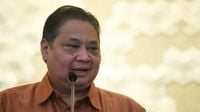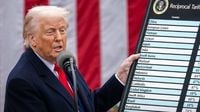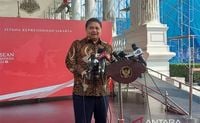In the wake of aggressive tariff policies implemented by the United States, experts are urging Indonesia to rethink its export strategy to enhance economic independence. The so-called "Trump effect" has reverberated through global trade channels, compelling nations to adapt swiftly to the changing landscape.
Since early April 2025, the U.S. has imposed additional tariffs on various products, including textiles, garments, and footwear, which previously faced tariffs ranging from 10% to 37%. With the new 10% tariff, the total import duty now fluctuates between 20% and 47%, depending on the product. This shift has raised alarms among Indonesian policymakers and business leaders alike.
Iskandar Sitorus, Secretary of the Indonesia Audit Watch (IAW), emphasized the need for Indonesia to view these tariffs not merely as obstacles but rather as a wake-up call. "Tariffs are not the enemy; they are an alarm. This is a warning that we have relied too long on raw commodity exports that offer minimal added value and contribution to state revenue," he stated in a message on Saturday, April 19, 2025.
Sitorus suggested that Indonesia must transition from being a mere supplier of raw materials to becoming an exporter of high-value processed goods. He identified six strategic sectors that should spearhead this transformation: processed food and beverages, premium fishery products, processed wood furniture, herbal cosmetics, technical textiles and medical products, as well as coconut and palm derivative products.
These sectors not only have a promising market abroad but also contribute significantly to state revenue through higher taxes, royalties, and robust foreign exchange earnings. Sitorus pointed out that relying on high-value exports could fortify the country's financial health without depending on raw commodities that are susceptible to global price fluctuations.
On a governmental level, Coordinating Minister for Economic Affairs Airlangga Hartarto announced plans to redirect some of Indonesia's exports toward Australia and Europe in response to the tariffs imposed by U.S. President Donald Trump. With 10% of Indonesia's exports currently directed at the U.S., Hartarto noted the importance of diversifying trade partnerships.
During a press conference held from the U.S. on April 18, Hartarto stated, "We are speaking with other partners, one of which is the EU, to increase our exports there." This move is intended to mitigate the anticipated decline in exports to the U.S. due to the new trade tariffs.
In addition to strengthening ties with European partners, Hartarto revealed that discussions with the Australian Minister of Trade had yielded positive results, with Australia expressing willingness to absorb a larger volume of Indonesian products. Furthermore, Indonesia plans to broaden its export reach to countries like Mexico and other Latin American nations.
The tariffs imposed by Trump have placed Indonesia in a challenging position, with a trade tariff of 32% levied on its exports, in addition to the existing 10% tariff. For textiles alone, the situation has become dire, with import tariffs now reaching a staggering 47%, up from the previous range of 10% to 37%.
As Indonesia grapples with these developments, the emphasis on reforming its export structure has never been more critical. Experts argue that the current challenges present an opportune moment for Indonesia to innovate and improve its trade practices. By focusing on high-value products, the country can enhance its competitiveness in the global market.
In summary, the impact of U.S. tariffs on Indonesian exports is significant, prompting both experts and government officials to call for a strategic overhaul of the nation’s export policies. As the global economy continues to evolve, Indonesia's ability to adapt will be crucial in securing its economic future.






